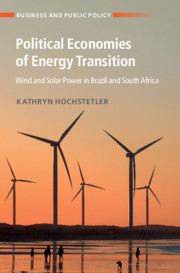Book contents
- Political Economies of Energy Transition
- Business and Public Policy
- Political Economies of Energy Transition
- Copyright page
- Contents
- Figures
- Tables
- Acknowledgments
- Abbreviations
- 1 Political Economies of Energy Transition in Brazil and South Africa
- 2 Wind and Solar Power in the Transition to a Low-Carbon Economy
- 3 States, Markets, and Energy Transition: Good Industrial Policy?
- 4 Electricity Consumption in Brazil and South Africa: Distribution and Prices
- 5 People and Place: Siting Wind and Solar Plants in Brazil and South Africa
- 6 Political Economies of Energy Transition
- References
- Index
1 - Political Economies of Energy Transition in Brazil and South Africa
Published online by Cambridge University Press: 12 November 2020
- Political Economies of Energy Transition
- Business and Public Policy
- Political Economies of Energy Transition
- Copyright page
- Contents
- Figures
- Tables
- Acknowledgments
- Abbreviations
- 1 Political Economies of Energy Transition in Brazil and South Africa
- 2 Wind and Solar Power in the Transition to a Low-Carbon Economy
- 3 States, Markets, and Energy Transition: Good Industrial Policy?
- 4 Electricity Consumption in Brazil and South Africa: Distribution and Prices
- 5 People and Place: Siting Wind and Solar Plants in Brazil and South Africa
- 6 Political Economies of Energy Transition
- References
- Index
Summary
This chapter presents the book’s major insight: no single “energy transition” takes place as countries contemplate adding wind and solar power. Rather, the issue convokes a variety of state and societal actors responding to the interests and institutions associated with four different policy arenas: climate change, industrial policy, electricity service provision, and the siting of infrastructure projects in communities. As the book shows, national energy transition results from the intersection of these arenas; some push transition forward; others hold it back. The chapter previews the overarching empirical argument that South Africa’s reliance on fossil fuel for electricity meant that climate concerns presented the sector with an existential threat, leading it to challenge energy transition on industrial policy and cost/consumption grounds, in a politicized process. Meanwhile, electricity’s small role in Brazil’s climate emissions led to a less politicized process: a series of national bureaucracies followed discrete standard procedures in interaction with just a few business/citizen groups, with industrial policy and cost concerns most influential in Brazil’s overall outcomes.
Keywords
- Type
- Chapter
- Information
- Political Economies of Energy TransitionWind and Solar Power in Brazil and South Africa, pp. 1 - 29Publisher: Cambridge University PressPrint publication year: 2020

